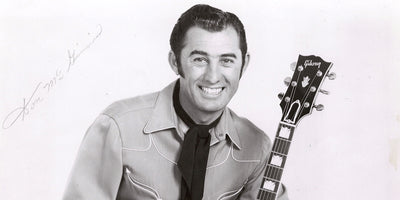In November of 1948 16-year-old Don McGinnis, his parents, and siblings drove cross country from North Carolina to Los Angeles. “There were ten of us in two cars with belongings and everything,” he explained. The country singer grew up working the long staple cotton fields of his family’s seven-acre farm, playing guitar and singing with his older siblings when they’d allow it. “When I was young I had a broom with the handle cut down, and I’d scratch it like I was playing rhythm,” he added.
He and his band The Cactus Cut-Ups, comprised of McGinnis and his brothers Doug and Joe, worked the San Fernando Valley country & western club circuit in the 1960s and 70s. They played original tunes and covers to glamorous crowds of Hollywood a-listers and wannabes, including the many film cowboys who filled LA’s soundstages and saloon sets. McGinnis headlined storied haunts, like The Palomino Club in North Hollywood and The Cowboy Palace Saloon in Chatsworth, where western wear icon Nudie Cohn, whose shop Nudie’s of Hollywood sat on the corner of Victory and Vineland in North Hollywood, was counted among those in the audience. “We always had a place set for him,” McGinnis said. “Nudie would come in and play his mandolin with us.” He even crafted custom stagewear for McGinnis and his brothers. “He had our picture up on the wall [of his shop] just like everybody else’s,” McGinnis said.
McGinnis began as an acolyte of Western swing crooner Hank Thompson, perhaps best known for his hit version of “The Wild Side of Life,” the song that prompted Kitty Wells’ “It Wasn’t God Who Made Honky Tonk Angels.” “The thing I wanted to do more than anything else was to get my diction right. I wanted people to hear every word,” McGinnis said. “And I think he was one of the best at that. I patterned myself after him and after Eddie Arnold.” Indeed, McGinnis’s elegant voice rings clear as a bell, his genteel North Carolina drawl refined by a full-throated delivery, two parts crooner and one part cowboy.
He began writing songs shortly after a stint in the Air Force in Las Vegas, and found an enthusiastic supporter in his brother Doug, who was also playing country music, as well as bit parts and heavies in Western films of the era. Doug had also opened The Mule Kick club in North Hollywood, which eventually became The Palomino. “He only had it for a few years before he sold it,” Mcginnis explained. “Then Bill and Tommy Thompson bought it and really merchandised it, brought all of the superstars in.”
The Palomino Club, considered one of the most important country music clubs in America, was a destination for local and touring talent from all matter of country subgenres. Everyone from the Everly Brothers to Johnny Cash, and the Flying Burrito Brothers to Tanya Tucker, played its stage at least once. In the 80s and 90s it was the incubator for the West Coast cowpunk sound, and home to the hardcore scene spearheaded by SST Records. Today, its iconic neon sign hangs in the Valley Relics Museum. “I played there time and time again,” Mcginnis said.
When he wasn’t gigging, or working at the small used car dealership he owned, McGinnis and his brothers recorded their original songs. Standout single “Star Light Star Bright” b/w “Good Luck To You” was tracked at PD Recording Studio on Chandler Boulevard in North Hollywood. McGinnis was introduced to the operation by his friend Billy Armstrong, a revered fiddle player. “An older lady who’d heard me record there asked the owner who I was,” he said. “He introduced me to her, and she told me she had a label called Reena Records.”
The head of Reena gave McGinnis a version of “Star Light Star Bright” that he felt was too similar to the traditional nursery rhyme. He rewrote it into the shuffling love prayer that garnered airplay on local radio. The haunting b-side, “Good Luck To You,” took him by surprise. “I had a really good guitar player by the name of Jerry Cole working with me at the time, and I took him to record that one,” he remembered. “I didn’t think it came out the country way I wanted it, but everybody else in the studio wanted to leave it.” Cole’s opening lick sets the tone for a broken-hearted ballad laced with mystery, where deception fills the air and love is unrequited. “Would you believe/That he doesn’t love you/I won’t be here waiting/Darlin’ good luck to you,” McGinnis sings over elegant strings, a forlorn crooner of film noir or the work of David Lynch. “Whiskey Sours and Wildwood Flowers,” finds him a heartbroken Honky Tonk narrator, while the previously unreleased track “Travelin’ Light” is an easygoing road song espousing the romance of travel, with an easygoing attitude and a sunny whistling.
Music never was a full-time venture for McGinnis. As the 1970s gave way to the 1980s, and line-dancing and pop-country began to fill the Valley’s clubs and airwaves, McGinnis packed up his saddle bags for a quiet family life. He lived in the Valley ara until his retirement, when he hauled back across the country to North Carolina. “I guess I’ve come full circle,” he observed. Today, his four singles for Reena Records, and one for shorter-lived operation Berdie, endure as a time capsule of style and musical community, sounds of a vibrant and mythical bygone era when cowboys roamed North Hollywood.



